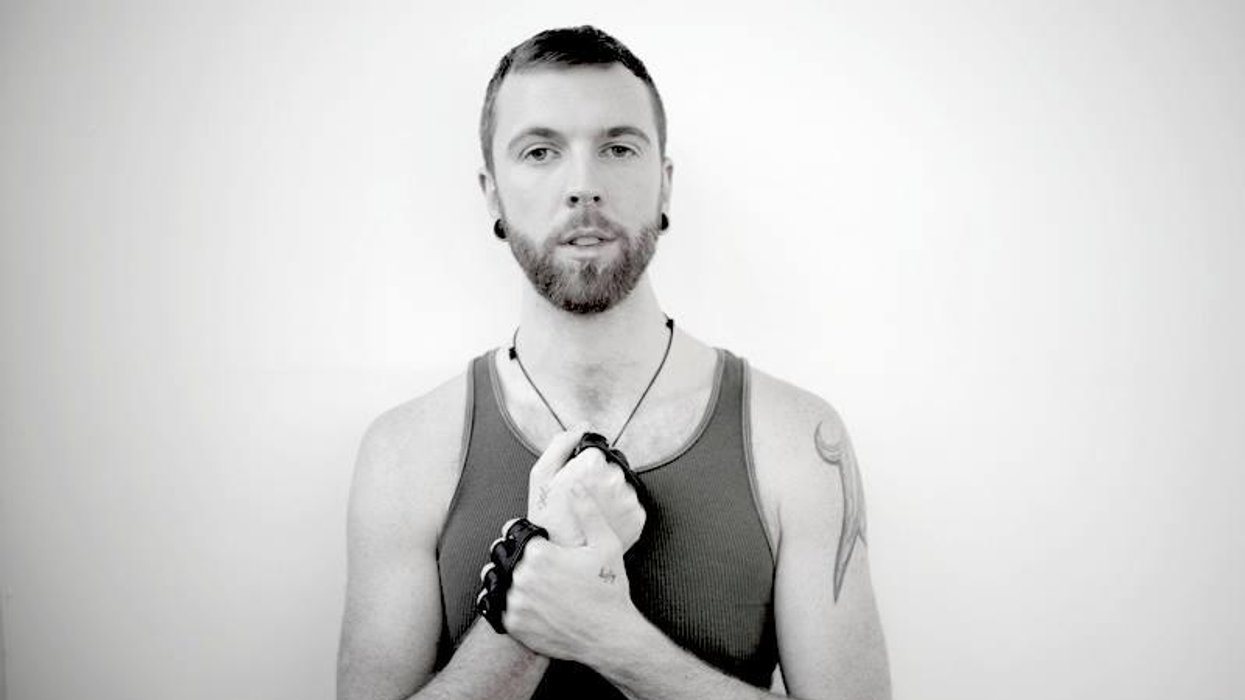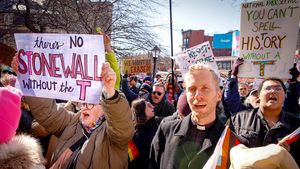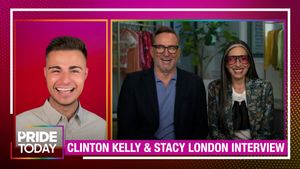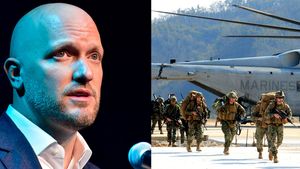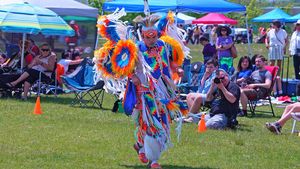Photo: Jen Painter
The media constantly bombards us with distorted images of chiseled perfection and bodies so unnaturally symmetrical, they could only be created through the magic of Photoshop. It's part of our culture, both in and out of the LGBT community, and like it or not, it's not going anywhere. Some artists buy into the facade and exploit it, and others who defy it, offering alternatives beyond what society says is "beautiful."
James Panther seems to have a remedy for all that plastic pretense. The talented singer-songwriter and producer creates the kind of genre-defying pop songs that empower and inspire, with honest lyrics that explore queer culture and spirituality, politics, and "raging against the machine." From his days singing in boy choirs to later attending Boston's Berklee College of Music, the musician is establishing himself as an artist of considerable note. He recently talked to Out about his artistic vision as we set to premiere the powerful new video for his latest single "Desirable" (available for purchase here).
Out: Can you describe what the James Panther sound is?
James Panther: It seems to be this theatrical, piano singer-songwriter pop with really honest lyrics. It's a stylistic hybrid between soul and alternative rock, but in a piano singer-songwriter format.
Can you share some of your musical influences?
Singer-songwriters like Tori Amos really made me want to start playing the piano, because of the dynamics that she has. I was never excited about the piano until I heard Tori Amos records when I was 16. I feel like you can hear that in the way that I play, that "Tori sound." Now as a songwriter, I don't feel I'm as much like Tori. I love pop music across the board and that's everything on Top 40 right now to Michael Jackson and Tina Turner, to stuff that was popular in the '60s and '70s. I like Janis Joplin and punk rock and I'm also a huge hip-hop fan. I also really love R&B and classic soul. It's really all over the place and it all gets filtered into my style.
How do you think your sound and music sets you apart from other LGBT singer-songwriters out there?
I'm looking to offer what I've learned about queer spirituality coming from Native American culture. About the whole idea of being two spirit. We had a sacred place in Native American culture, and it wasn't that we were just tolerated and accepted. We were a hugely important part of the community. I think that there's a self-respect that I needed to find that wasn't so based on punk rock and being reactive.
At 21, I got super into punk, like Bikini Kill and was angry and I needed to be angry because I was so wounded and I felt so disenfranchised like a lot of other queers, that I really needed to let a lot of that go for my own health. This whole idea of self-respect that comes from nature and comes from the older views of different indigenous people about the value of queer people, or two spirit people, really helped me understand what my value is in culture.
I feel like if you're a kid in the middle of the country, in a really homophobic environment and you can find this video of "Desirable" on YouTube, then you can see like, "Whoa, there are options out there." I'm not just this buff dude or catty drag queen. Let me say that I respect what drag queens do and there are couple of drag queens in my video, but I was just watching RuPaul's Drag Race recently and thought, Yes this is a competition, but there's so much of queer culture that's been so reactive to our oppression. I want to see us sink into our self-worth deeply so that we don't have to feel reactive.
"Desirable" is your first music video and it seemed to be a very hands-on experience since you were you able to have a say in the visual narrative of everything. Can you tell us a little bit about that process?
I basically came up with the whole visual narrative by myself, and did the post-production work with my editor Mariko. All of the parts of the video were different facets of my life. I had actually done this "Shame Clown" performance art thing a few years before, and it just seemed right to have it be part of the video. I wanted to make a statement about that shame archetype that I think a lot of people are carrying around privately. Dramatizing it felt perfect, and I created this whole nightmarish scene of being hated on and hating yourself, and juxtaposed it with this shaman, spiritual character. I've been a big part of the west coast traveler culture for the last five years and that's been a huge motivator, gathering culture and spiritual communities and radical queer communities. It was very autobiographical in a way.
What would you say is the overall theme of both the video and the lyrics of 'Desirable'?
The overall theme is calling out what I think is problematic about the world we live in, and the capitalistic paradigm of always needing to be more and buy more and perfect your body, or change yourself to be desirable for someone else. When you're in nature and when you're in a community of people who let you be your whole integrated self, you find it within yourself to get out of this self-shaming paradigm. This sort of toxic private relationship with yourself is based on a lot of external images from the media. There's a simplicity in just kind of letting yourself be.
When you're in that space helping people -- when you're letting go of the race, the race of this world and the competitive aspect -- I think it makes you more beautiful. The whole word "desirable" is about what someone else thinks of you and so this a sort of a return to, what do you think of yourself and what makes you feel good about life? That translates to a lot of beauty.
There was a conscious decision to begin the video in stark black-and-white and then slowly let everything erupt in color. Tell me about that and the use of mirrors -- both inside and outdoors?
That was very deliberate. I wanted to have the journey of the video go from being in this toxic, crammed, confining inner world and really be reflective of those moments that we all have. I wanted to show that sort of relationship with yourself in the mirror, when you're picking yourself apart in private. The arch of the video was to show everything slowly comes into color the more you find your self-impowerment and break out of your own little bubble of fear and insecurity. I wanted something witchy. I think that's part of my vibe, this queer spirituality vibe. I'm also coming from this punk rock background and so like I think you get witchy when you see those things together. The black and white to color was just showing about getting out of the inner world and into community really.
What was the moment you decided to change your name from Jamie Treadwell to James Panther?
Well, it had a lot to do with medicine work and Ayahuasca ceremonies. It became clear that James felt like a more solid name. It is my birth name, but Jamie was always my nickname. I'm from Jersey, it's not like I'm going to find an animal name to call myself. [Laughs] I was having dreams about black panthers, I was having visions about black panthers. I was having very intense ceremonial experiences where that was the spirit that was moving through me. The more I looked into it, the more it was like, well panthers stalk at night in the shadows, they prowl around in the darkness, and can carry three times their body weight up a tree. This feels like my life. This feels like I'm totally off the beaten path for what most queer artists are doing, or what the queer community is doing. It felt like a strong name and I just kinda tried it on and it worked.
You had a shamanic yoga teacher training experience with renowned yoga pioneer Ana Forrest. How did that set you on a new spiritual path?
In terms of my development I think everything is all interrelated. I sort of see it like this building that happened. It started with the choir stuff, and it kind of gave way to Berkley and songwriting, rock music and punk rock and then went kind of deeply, darkly into that whole world and lifestyle. I then was doing this yoga teacher training and began deeply healing myself. Training with her was a shamanic experience. It was like really, really intensely going into my soul. We did a death meditation halfway through the training. We were doing really intense yoga everyday, but it was also an incredibly compassionate environment that was teaching me how to radically care for yourself.
How are you now marketing your image, message and music?
I guess the way I see myself is, it has a lot to do with getting back to nature. I have this concept in my mind, this sort of dream of popular music turning into this fusion of the '90s and the '60s. Like, I'm really obsessed with Rage Against the Machine, and I would love it if there was this super-political, aggressive, but back to nature and free love kind of thing happening at the same time. So for me, I think my place is both being the guy who is the real straight talker, and being the guy who is holding space for people to go deeper into their emotions -- deeper into their inner world, but in a really empowering way.
There's a lot of straight people who love my music, and in a way it's sort of weird. What does it mean to be an LGBT artist? I feel like even so much of that is that it's a subculture only because of oppression and because of homophobia. The LGBT subculture exists because of hatred unfortunately and needing to make a new culture where we can be safe. I'm not just interested in bringing queer spirituality, empowerment and free love only for queer people. I'm interested in showing that that can be medicine for everybody.
What's next for you? Any touring or a debut album in the future?
I'm getting some shows booked for the Spring and the Summer and I want to really get "Desirable" on the radio. It has this uplifting quality to it and a humanitarian quality to it, and so I feel a sense of purpose in getting it out to as many people as possible. I have an album's worth of material that I really want to lump together into a conceptual record. I have a lot of ideas that I want to communicate and stories that haven't been told and I think need to be told.
Follow him on Twitter and find out more at JamesPantherMusic.com
